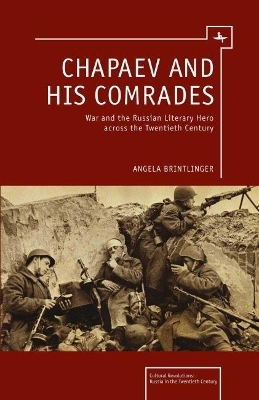
Chapaev and his Comrades
War and the Russian Literary Hero Across the Twentieth Century
Seiten
2018
Academic Studies Press (Verlag)
978-1-61811-822-6 (ISBN)
Academic Studies Press (Verlag)
978-1-61811-822-6 (ISBN)
Across the twentieth century, war was the experience of the Russian people, and it became a dominant trope to represent the Soviet experience in literature as well as other areas of cultural life. This book traces those war experiences, memories, tropes, and metaphors in the literature of the Soviet and post-Soviet period.
Across the twentieth century, the Russian literary hero remained central to Russian fiction and frequently “battled” one enemy or another, whether on the battlefield or on a civilian front. War was the experience of the Russian people, and it became a dominant trope to represent the Soviet experience in literature as well as other areas of cultural life. This book traces those war experiences, memories, tropes, and metaphors in the literature of the Soviet and post-Soviet period, examining the work of Dmitry Furmanov, Fyodor Gladkov, Alexander Tvardovsky, Emmanuil Kazakevich, Vera Panova, Viktor Nekrasov, Alexander Solzhenitsyn, Vladimir Voinovich, Sergei Dovlatov, Vladimir Makanin, Viktor Astafiev, Viktor Pelevin, and Vasily Aksyonov. These authors represented official Soviet literature and underground or dissident literature; they fell into and out of favor, were exiled and returned to Russia, died at home and abroad. Most importantly, they were all touched by war, and they reacted to the state of war in their literary works.
Across the twentieth century, the Russian literary hero remained central to Russian fiction and frequently “battled” one enemy or another, whether on the battlefield or on a civilian front. War was the experience of the Russian people, and it became a dominant trope to represent the Soviet experience in literature as well as other areas of cultural life. This book traces those war experiences, memories, tropes, and metaphors in the literature of the Soviet and post-Soviet period, examining the work of Dmitry Furmanov, Fyodor Gladkov, Alexander Tvardovsky, Emmanuil Kazakevich, Vera Panova, Viktor Nekrasov, Alexander Solzhenitsyn, Vladimir Voinovich, Sergei Dovlatov, Vladimir Makanin, Viktor Astafiev, Viktor Pelevin, and Vasily Aksyonov. These authors represented official Soviet literature and underground or dissident literature; they fell into and out of favor, were exiled and returned to Russia, died at home and abroad. Most importantly, they were all touched by war, and they reacted to the state of war in their literary works.
Angela Brintlinger (PhD University of Wisconsin) is an associate professor and the graduate studies chair of the Department of Slavic and East European Languages andLiteratures at Ohio State University. She is the author of Writing a Usable Past: Russian Literary Culture 1917-1937 (2000) and co-edited with Ilya Vinitsky the book Madness and the Mad in Russian Culture (2007).
| Erscheinungsdatum | 19.06.2018 |
|---|---|
| Reihe/Serie | Cultural Revolutions: Russia in the Twentieth Century |
| Zusatzinfo | Illustrations |
| Verlagsort | Brighton |
| Sprache | englisch |
| Maße | 155 x 234 mm |
| Themenwelt | Geisteswissenschaften ► Geschichte ► Regional- / Ländergeschichte |
| Geisteswissenschaften ► Sprach- / Literaturwissenschaft ► Anglistik / Amerikanistik | |
| Geisteswissenschaften ► Sprach- / Literaturwissenschaft ► Literaturwissenschaft | |
| Geisteswissenschaften ► Sprach- / Literaturwissenschaft ► Slavistik | |
| ISBN-10 | 1-61811-822-6 / 1618118226 |
| ISBN-13 | 978-1-61811-822-6 / 9781618118226 |
| Zustand | Neuware |
| Haben Sie eine Frage zum Produkt? |
Mehr entdecken
aus dem Bereich
aus dem Bereich
Universalgelehrter, Polarreisender, Entdecker
Buch | Hardcover (2024)
mareverlag
CHF 39,20


